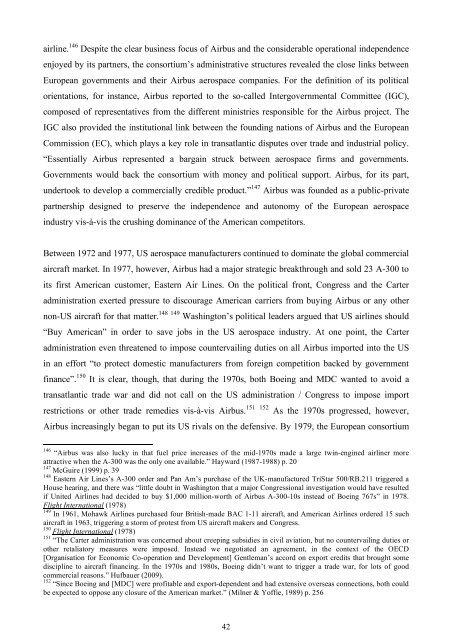Ethnocentric vs. Regiocentric Consolidation in the Aerospace and
Ethnocentric vs. Regiocentric Consolidation in the Aerospace and
Ethnocentric vs. Regiocentric Consolidation in the Aerospace and
Create successful ePaper yourself
Turn your PDF publications into a flip-book with our unique Google optimized e-Paper software.
airl<strong>in</strong>e. 146 Despite <strong>the</strong> clear bus<strong>in</strong>ess focus of Airbus <strong>and</strong> <strong>the</strong> considerable operational <strong>in</strong>dependence<br />
enjoyed by its partners, <strong>the</strong> consortium’s adm<strong>in</strong>istrative structures revealed <strong>the</strong> close l<strong>in</strong>ks between<br />
European governments <strong>and</strong> <strong>the</strong>ir Airbus aerospace companies. For <strong>the</strong> def<strong>in</strong>ition of its political<br />
orientations, for <strong>in</strong>stance, Airbus reported to <strong>the</strong> so-called Intergovernmental Committee (IGC),<br />
composed of representatives from <strong>the</strong> different m<strong>in</strong>istries responsible for <strong>the</strong> Airbus project. The<br />
IGC also provided <strong>the</strong> <strong>in</strong>stitutional l<strong>in</strong>k between <strong>the</strong> found<strong>in</strong>g nations of Airbus <strong>and</strong> <strong>the</strong> European<br />
Commission (EC), which plays a key role <strong>in</strong> transatlantic disputes over trade <strong>and</strong> <strong>in</strong>dustrial policy.<br />
“Essentially Airbus represented a barga<strong>in</strong> struck between aerospace firms <strong>and</strong> governments.<br />
Governments would back <strong>the</strong> consortium with money <strong>and</strong> political support. Airbus, for its part,<br />
undertook to develop a commercially credible product.” 147 Airbus was founded as a public-private<br />
partnership designed to preserve <strong>the</strong> <strong>in</strong>dependence <strong>and</strong> autonomy of <strong>the</strong> European aerospace<br />
<strong>in</strong>dustry vis-à-vis <strong>the</strong> crush<strong>in</strong>g dom<strong>in</strong>ance of <strong>the</strong> American competitors.<br />
Between 1972 <strong>and</strong> 1977, US aerospace manufacturers cont<strong>in</strong>ued to dom<strong>in</strong>ate <strong>the</strong> global commercial<br />
aircraft market. In 1977, however, Airbus had a major strategic breakthrough <strong>and</strong> sold 23 A-300 to<br />
its first American customer, Eastern Air L<strong>in</strong>es. On <strong>the</strong> political front, Congress <strong>and</strong> <strong>the</strong> Carter<br />
adm<strong>in</strong>istration exerted pressure to discourage American carriers from buy<strong>in</strong>g Airbus or any o<strong>the</strong>r<br />
non-US aircraft for that matter. 148 149 Wash<strong>in</strong>gton’s political leaders argued that US airl<strong>in</strong>es should<br />
“Buy American” <strong>in</strong> order to save jobs <strong>in</strong> <strong>the</strong> US aerospace <strong>in</strong>dustry. At one po<strong>in</strong>t, <strong>the</strong> Carter<br />
adm<strong>in</strong>istration even threatened to impose countervail<strong>in</strong>g duties on all Airbus imported <strong>in</strong>to <strong>the</strong> US<br />
<strong>in</strong> an effort “to protect domestic manufacturers from foreign competition backed by government<br />
f<strong>in</strong>ance”. 150 It is clear, though, that dur<strong>in</strong>g <strong>the</strong> 1970s, both Boe<strong>in</strong>g <strong>and</strong> MDC wanted to avoid a<br />
transatlantic trade war <strong>and</strong> did not call on <strong>the</strong> US adm<strong>in</strong>istration / Congress to impose import<br />
restrictions or o<strong>the</strong>r trade remedies vis-à-vis Airbus. 151 152 As <strong>the</strong> 1970s progressed, however,<br />
Airbus <strong>in</strong>creas<strong>in</strong>gly began to put its US rivals on <strong>the</strong> defensive. By 1979, <strong>the</strong> European consortium<br />
146 “Airbus was also lucky <strong>in</strong> that fuel price <strong>in</strong>creases of <strong>the</strong> mid-1970s made a large tw<strong>in</strong>-eng<strong>in</strong>ed airl<strong>in</strong>er more<br />
attractive when <strong>the</strong> A-300 was <strong>the</strong> only one available.” Hayward (1987-1988) p. 20<br />
147 McGuire (1999) p. 39<br />
148 Eastern Air L<strong>in</strong>es’s A-300 order <strong>and</strong> Pan Am’s purchase of <strong>the</strong> UK-manufactured TriStar 500/RB.211 triggered a<br />
House hear<strong>in</strong>g, <strong>and</strong> <strong>the</strong>re was “little doubt <strong>in</strong> Wash<strong>in</strong>gton that a major Congressional <strong>in</strong>vestigation would have resulted<br />
if United Airl<strong>in</strong>es had decided to buy $1,000 million-worth of Airbus A-300-10s <strong>in</strong>stead of Boe<strong>in</strong>g 767s” <strong>in</strong> 1978.<br />
Flight International (1978)<br />
149 In 1961, Mohawk Airl<strong>in</strong>es purchased four British-made BAC 1-11 aircraft, <strong>and</strong> American Airl<strong>in</strong>es ordered 15 such<br />
aircraft <strong>in</strong> 1963, trigger<strong>in</strong>g a storm of protest from US aircraft makers <strong>and</strong> Congress.<br />
150 Flight International (1978)<br />
151 “The Carter adm<strong>in</strong>istration was concerned about creep<strong>in</strong>g subsidies <strong>in</strong> civil aviation, but no countervail<strong>in</strong>g duties or<br />
o<strong>the</strong>r retaliatory measures were imposed. Instead we negotiated an agreement, <strong>in</strong> <strong>the</strong> context of <strong>the</strong> OECD<br />
[Organisation for Economic Co-operation <strong>and</strong> Development] Gentleman’s accord on export credits that brought some<br />
discipl<strong>in</strong>e to aircraft f<strong>in</strong>anc<strong>in</strong>g. In <strong>the</strong> 1970s <strong>and</strong> 1980s, Boe<strong>in</strong>g didn’t want to trigger a trade war, for lots of good<br />
commercial reasons.” Hufbauer (2009).<br />
152 “S<strong>in</strong>ce Boe<strong>in</strong>g <strong>and</strong> [MDC] were profitable <strong>and</strong> export-dependent <strong>and</strong> had extensive overseas connections, both could<br />
be expected to oppose any closure of <strong>the</strong> American market.” (Milner & Yoffie, 1989) p. 256<br />
42

















